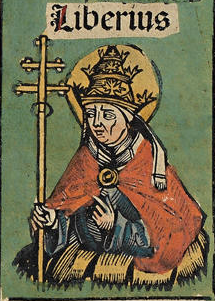Liberius | |
|---|---|
| Bishop of Rome | |
 Pope Liberius in the Nuremberg Chronicle | |
| Church | Catholic Church |
| Papacy began | 17 May 352[a] |
| Papacy ended | 24 September 366[1] |
| Predecessor | Julius I |
| Successor | Damasus I |
| Personal details | |
| Died | 24 September 366 Rome |
| Sainthood | |
| Venerated in | Eastern Orthodox Church[2] |
Pope Liberius (310 – 24 September 366) was the bishop of Rome from 17 May 352 until his death.[3] According to the Catalogus Liberianus, he was consecrated on 22 May as the successor to Julius I. He is not mentioned as a saint in the Roman Martyrology. That makes him the earliest pontiff not to be venerated as a saint in the Catholic Church and, along with Anastasius II, one of only two popes to be omitted from Catholic sainthood in the first 500 years of church history.
Liberius is mentioned in the Greek Menology, the Eastern equivalent to the martyrologies of the Western Church and a measure of sainthood prior to the institution of the formal Western processes of canonization.[4]
Cite error: There are <ref group=lower-alpha> tags or {{efn}} templates on this page, but the references will not show without a {{reflist|group=lower-alpha}} template or {{notelist}} template (see the help page).
- ^ "Liberius | pope | Britannica". www.britannica.com. Retrieved 16 April 2023.
- ^ "Saint Liberius, Pope of Rome". OCA.org. Retrieved 10 July 2024.
Saint Liberius the Confessor, Bishop of Rome, became Bishop of Rome in the year 352, after the death of Pope Julius. Saint Liberius was a fervent proponent of Orthodoxy against the Arian heresy and a defender of Saint Athanasius of Alexandria (May 2).
- ^ Herbermann, Charles, ed. (1913). . Catholic Encyclopedia. New York: Robert Appleton Company.
- ^ "Saint Liberius, Pope of Rome". Orthodox Church in America. Retrieved 3 December 2023.